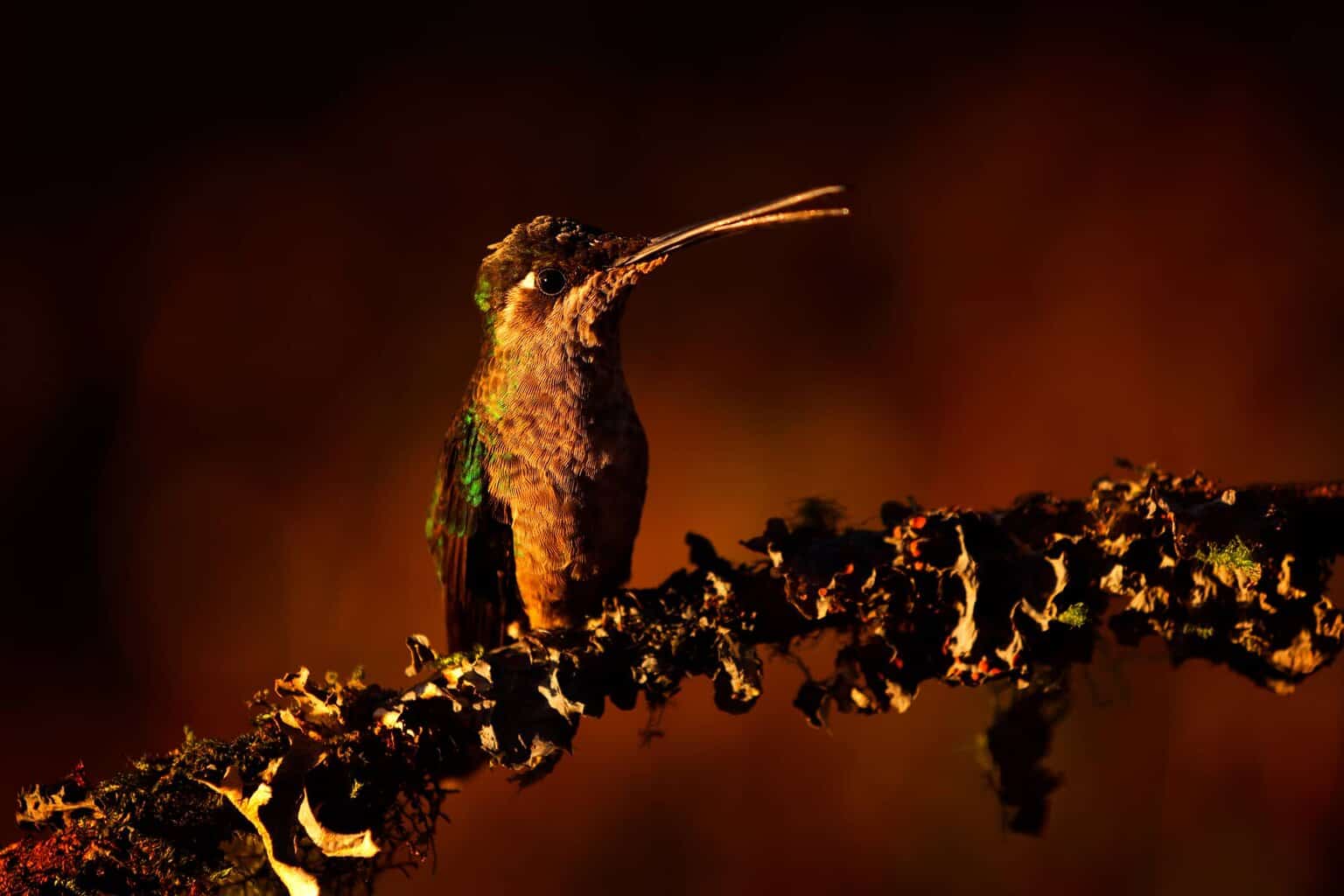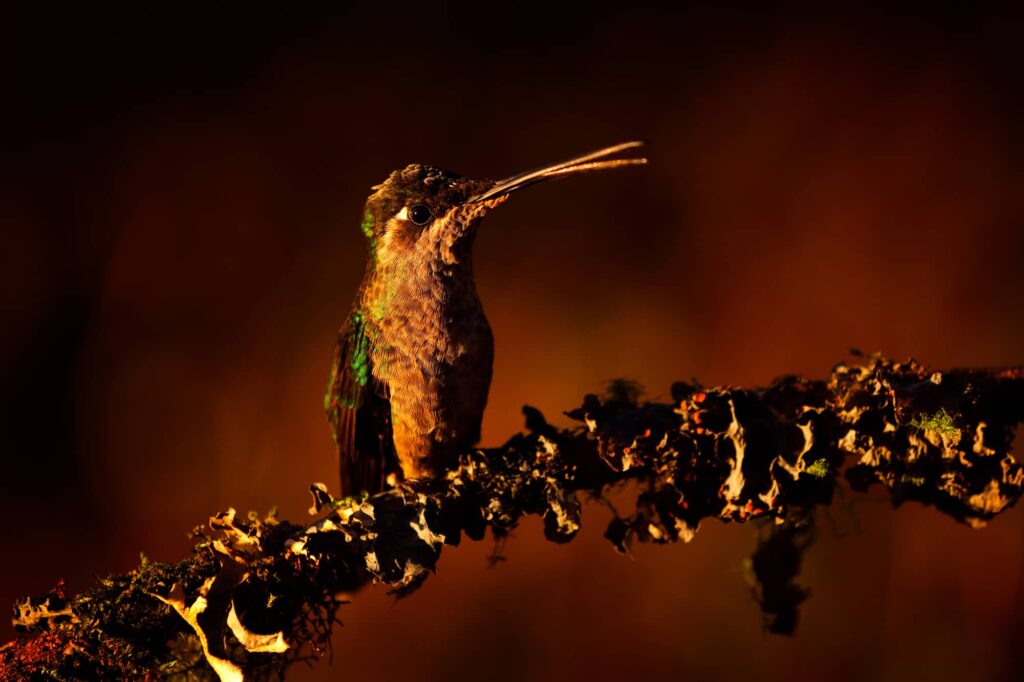Hummingbirds are so active and busy during the day, flitting about so quickly. It can be difficult to imagine this bird species at rest. You might be wondering where hummingbirds in your garden or area go at night.
Do hummingbirds sleep every night?
Like other non-nocturnal creatures, hummingbirds need a period of rest at night. Hummingbirds use so much energy during the day that they require some time to rest and recuperate during the night.
However, hummingbirds go one step further. Rather than just going to sleep, they will often enter a form of hibernation known as torpor in cold temperatures. Torpor is a deep, resting state during which their metabolic rate slows, and their body temperature drops dramatically.
This method of sleep allows them to conserve energy and cope with cold weather once the sun goes down, and can vary in its degree. Sometimes, hummingbirds will enter a light torpor, but they can also enter a deeper torpor when their metabolic rate, temperature, and other bodily functions drop significantly.
Astonishingly, when they are in a state of torpor, hummingbirds may even end up clinging onto a branch upside down. They can latch on firmly to a tree branch. But if the limb is slippery and smooth, they may slip around and won’t right themselves until they awaken in the morning.
Interestingly, hummingbirds living in warmer climes may also enter a state of torpor during the heat of the day. Warm weather can trigger them to conserve energy in sweltering temperatures.
Most nights, most hummingbirds will rest and may enter this state. It can occur at any time of year. However, while this is the norm, there are times when hummingbirds will not sleep or enter a period of torpor as they usually would.
Another thing to note is that once a female hummingbird has laid her eggs, she will incubate them all night. A mother hummingbird will not leave the nest during the day except for brief feeding trips and will remain out of a state of torpor on cold nights because her body heat is required to keep her eggs warm. So when a hummingbird nests, its sleep patterns will not always be the same.
What does it mean when you see a hummingbird at night?
In warmer climates and during warm summer days, these beautiful birds may occasionally remain active for a while after dark to eat. An artificial light source might also disrupt nighttime hummingbird schedules. If there are strong artificial lights, hummingbirds may not realize that night has arrived and keep flying and feeding.
Another thing to note is that it is common for hummingbirds to fly at night during the migration season. During the migration period, some species must travel at night to cover large distances of hundreds of miles to make it across the Gulf of Mexico or other stretches where there is no place to rest.
If you believe that you have seen a hummingbird at night, you may instead have seen a hummingbird moth. These look remarkably like hummingbirds but are far more likely to be active after dark.
How long does a hummingbird sleep?
Adult hummingbirds will typically settle down to rest half an hour or so before it gets dark and start to awake at dawn. This means that their sleep and torpor cycles can vary between 8 and 16 hrs, though this can change significantly depending on the location and the time of year.
Where do hummingbirds sleep at night?

Hummingbirds will sleep in sheltered and secure locations at night, perched on the tips of branches. They will typically choose to rest in shrubs or on horizontal tree branches, which offer some protection from the elements. They tend to favor deciduous trees such as oak, birch, or poplar and choose their own sheltered spots on tree branches – not resting snuggled up with other birds, but each solitary bird on its own.
If a hummingbird finds a suitable spot, it will retain it for as long as it remains in a given area. They will tend to prefer locations that are out of sight, and so you are far less likely to be able to spot them during the night than you are during the day.
However, you may occasionally spot an upside down hummingbird in a state of torpor hanging from a feeder. The birds are believed to do this occasionally to have quick and easy access to a food supply as soon as they wake up.
Where do hummingbirds sleep when it rains?
Hummingbirds will also tend to find a sheltered spot in trees or shrubs to perch in during the day when it rains. The canopy above will shelter them from the worst of the wet, and dense surrounding foliage will keep them out of cold winds.
Do hummingbirds come out at night to eat?
Hummingbirds don’t usually come out to eat after dark. Some people imagine that a hummingbird’s high energy needs mean that it needs to feed constantly – even when it gets dark. But hummingbirds do their feeding almost exclusively during the day.
Hummingbirds’ eyes are not adapted to see well in low light levels, even though they see exceptionally well during the day. Since they are almost always inactive at night, they simply have not had to adapt to see well after the sun goes down.
However, hummingbirds will occasionally remain active for a while after the sun goes down or if there are abundant artificial lights. However, nighttime feeding is not normal behavior.
Do hummingbirds visit feeders at night?
Hummingbirds won’t usually visit feeders at night. Even when food is readily available, whether in feeders or naturally available in your garden, hummingbirds need to rest to conserve their energy levels
Hummingbird feeders can therefore be taken down at night. This can be a good idea in colder regions where hummingbirds are present in winter since this can prevent the feeders from freezing.
What would empty a hummingbird feeder at night?
If the nectar levels are going down on a hummingbird feeder at night – hummingbirds are unlikely to be the culprits. The offenders may be bats, flying squirrels, or raccoons, though the last of these will often destroy a feeder rather than just emptying it.
Remember, bats are highly beneficial and will help keep insect pest numbers down. So you don’t necessarily have to prevent them from feeding, and it can be a good idea to feed them, too. Just make sure you refill your feeders so that hummingbirds always have a food source on hand.
What times do hummingbirds feed?
As mentioned above, hummingbirds don’t usually feed after dark. So when should you expect them to feed?
A hummingbird that has entered a state of torpor will usually take 20 minutes to an hour to fully awaken. This period is necessary to increase heart rate, breathing rate, and temperature. This may occur a while before the sun rises or once the sun rises and temperatures increase.
Once they are awake, hummingbirds are in a constant feeding frenzy – trying to obtain as much precious energy as possible. You will usually see these amazing creatures on your feeders and gather nectar and insects from around your garden throughout the daylight hours.

